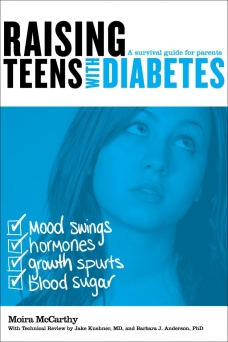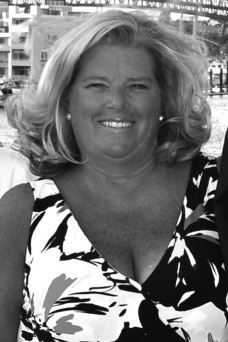Dialoging about Diabetes: PWDs Offer Ways to Improve Communication and Care #8 Moira McCarthy, Raising Teens with Diabetes
 As a diabetes educator/healthcare provider (DHCP) I’m observing that the rapidly growing world of the Diabetes Online Community, the DOC for short, is helping people with diabetes (PWD) and their loved ones find support and feel supported. People and their caregivers are connecting, building relationships and feeling more positive about the challenges of managing their diabetes. I’m delighted to see this trend!
As a diabetes educator/healthcare provider (DHCP) I’m observing that the rapidly growing world of the Diabetes Online Community, the DOC for short, is helping people with diabetes (PWD) and their loved ones find support and feel supported. People and their caregivers are connecting, building relationships and feeling more positive about the challenges of managing their diabetes. I’m delighted to see this trend!
As a DHCP I’ve long realized that I can’t walk a mile in a PWD shoes (or a parent’s in this case). I can’t know what it is like day in, day out to deal with this challenging and relentless disease. But, what I do know is that we can learn from each other to change the dialog between providers and PWD to be more positive, more supportive.
Goal one with these Dialoging about Diabetes interviews with diabetes activists is to help make living with diabetes…just a bit easier. Goal two is to enhance the two-way street – to help more PWD get connected and encourage more DHCPs to open the doors of social networking to PWD.
Here’s my dialog with Moira McCarthy, mother of Lauren who is now 21 years old. Moira’s daughter Lauren was diagnosed with type 1 diabetes in 1997 at 6 years old. Moira is number one a MOM, but she’s also an active diabetes blogger at despitediabetes.com. She’s also a non- stop diabetes activist and advocate. She was recognized in 2007 as the JDRF International Volunteer of the Year. McCarthy is also a journalist and author who’s written several books about raising children with diabetes and has just released her latest book, Raising Teens with Diabetes: A Survival Guide for Parents. (Here's my review of it on amazon. I've also added this book to my amazon a-store).
stop diabetes activist and advocate. She was recognized in 2007 as the JDRF International Volunteer of the Year. McCarthy is also a journalist and author who’s written several books about raising children with diabetes and has just released her latest book, Raising Teens with Diabetes: A Survival Guide for Parents. (Here's my review of it on amazon. I've also added this book to my amazon a-store).
HW Q: In your book you describe how you thought you had this “diabetes management thing” all figured out until your daughter hit puberty. Can you capture what that was like and offer insights to parents or caregivers?
MM A: When you have a cooperative, intelligent and kind child with diabetes who is not yet a teen, it’s easy to convince yourself that you’ve done everything right, and that they are smart enough to take on “some” diabetes management “on their own.” Like checking their BG and reporting the results to you. What I didn’t count on was the general challenges of being a teen; wanting freedom, not wanting to do exactly what your parents think you should do, not caring about the future and instead just caring about the moment. So my pride – in my daughter’s ability to manage her diabetes and my own “parental awesomeness” (ha!), got in the way of noticing signs of trouble.
I will say though: once I did notice, I learned, focused and dug deep. Things were not perfect, but we worked through them and my daughter stayed safe and happy. My advice: assume there could be trouble ahead. Watch for tips offs: lost meters, forgotten checks and mysterious “bad pump sites.” Privately ask questions. Then make sure your child is safe and supported.
HW Q: What are your learnings and messages to us diabetes healthcare providers (DHCPs) about helping parents and their teen age children cope with diabetes during the teen years?
MM A: Parents, for the most part, are great at how we parent younger kids with diabetes and how we help adults deal with diabetes. But the in-between – these transitional years – need more focus. I would love DHCPs to dig deeper into what makes a teen tick and what works for them. They need to banish the threats, like “You’re going to get complications!”, or suggest punishments, like taking away cell phones or video games, for not checking BG. The best thing DHCPs can do is help teens and their parents know that it is going to be okay.
My daughter tells me now the biggest thing that blocked her from turning things around was the deep notion that she’d already ruined her health. The other thing DHCPs can do is help the teen become a partner in their diabetes plan. Listen to what the teen says works for them, then find a way to help them be empowered. Most of all: show compassion. These kids might not show it, but they are already beating themselves up over all of this.
HW Q: What messages do you have for PWDs about more actively communicating what they and their teen(s) need from their DHCPs?
 MM A: Help your teen decide and embrace what kind of teen life they want to live. Then communicate this to your DHCPs and invite them to partner with your teen to help them make their dreams their reality. In other words, your teen is the player and their DHCP is the coach. A good coach knows how to motivate and guide the player to achieve their goals. A well-coached player trusts the coach.
MM A: Help your teen decide and embrace what kind of teen life they want to live. Then communicate this to your DHCPs and invite them to partner with your teen to help them make their dreams their reality. In other words, your teen is the player and their DHCP is the coach. A good coach knows how to motivate and guide the player to achieve their goals. A well-coached player trusts the coach.
HW Q: Lauren and your family have certainly had some amazing opportunities over the years to advocate for people with diabetes. Can you recap a couple of these?
MM A: The experiences and opportunities Lauren has had have been remarkable; mostly because she really is just a regular kid from a regular family. Lauren got to know the late, and we would say great, Senator Ted Kennedy through JDRF’s “Promise to Remember Me” Campaign. She first met with him when she was 11. They just clicked. Before we knew it they’d developed a friendship and partnership in working toward a cure that is almost unmatched in patient advocacy. She testified before Congress twice! She was chosen by him to speak in his tribute at the Democratic National Convention in 2008 (Check it out). A few days before he passed away, his team called her and told her he was asking that she be the person the media contacted after he passed away. It was a humbling, sad and yet a beautiful honor. We had Good Morning America here when Lauren was grieving her dear friend. She is now going into her senior year in college in Washington DC majoring in political communication. No coincidence I think!
As for me, our family was asked to be the Chair Family of JDRF’s Children’s Congress, perhaps the most important and influential role a family can have in JDRF. I work as a writer but was hesitant on the whole diabetes blogging thing. Then diabetesmine.com asked me to write a guest blog. Pretty soon I launched my blog despitediabetes.com. It helps me feel connected in this D world.
HW Q: You’ve been SO involved in diabetes advocacy with JDRF, Clara Barton Camp, and the Diabetes Scholars Foundation. Can you tell us why being an advocate is so important? Please offer suggestions about the baby steps people can take to get involved.
MM A: For me it was always about empowerment. You can feel so stripped of power in this D world. A week of weird highs. A crazy low that freaks you out. Not being able to get your teen to want to come on board with care. It’s soul-crushing at times. But by doing, I never have a day when I don’t think “well … we’re making progress.” I love political advocacy so that’s been a big thing for me. But fundraising is important too. We did the JDRF walk for years and raised hundreds of thousands. Last year I got on a bike for the first time in 25 years and trained and did the 105 mile Death Valley Ride to Cure. I raised nearly $40,000 - one of the top riders in the country. To get involved? Pick the charity or cause that speaks to you and raise your hand for them. They’re waiting. If we can do this, anyone can.
HW Q: As a Mom and diabetes advocate long before the DOC has been around, how do you think the DOC has changed/improved communication both for parents and teens? How do you suggest parents and teens stick their toes in the DOC if they haven’t?
MM A: The DOC is a blessing and a curse, depending on how you use it. When Lauren was diagnosed it was the dark ages and I was very much alone. When I finally got dial up (ha!) I found childrenwithdiabetes.com and my life changed for the better. Today parents and PWDs can find many sources of support online. But I encourage people to be careful with it. Sometimes I worry – particularly about newer patients and parents. All that info can be too much. And don’t believe everything you read!
HW: Q: What do you think DHCPs should be telling/advising teens with diabetes and their parents about engaging in the DOC and connecting with others in general? How does engaging improve things?
MM A: Support is a wonderful and much needed thing. Find it and use it for support, education and ideas. Use it to realize that you are not alone in what you are going through. Use it to laugh, vent, cry, debate and scream. But always use your medical team for the nuts and bolts.
HW Q: When I meet and talk to parents of kids with diabetes and adults with diabetes I talk about making lemonade out of lemons (the lemon of developing diabetes). Can you share your thoughts?
MM A: Even without diabetes, I’m pretty sure Lauren was destined for this future. I’m pretty sure I was going to succeed in the writing world. I’m pretty sure my husband was going to rock his career and my daughter without diabetes was going to grow into a wonderful adult. But diabetes forced us to flex our muscles more. You know how they say if you have to lift a car to save someone’s life you all of a sudden can use the muscles you need to do that? For us diabetes was that car.
HW Q: What in your heart do you want your book(s) to convey to parents and their teen(s)?
MM A: That they can do it. That they are going to be okay. When Lauren had her one and only “poor choices” DKA, I felt so ashamed. Over time, I realized we were not alone, but that everyone else carries around these shameful feelings too. I want to rip away that shame and instead open this up wide. From there, I think we’ll all achieve better care through these teen years.
HW Q: How can people connect and follow you online?
MM A: On facebook find me at: facebook.com/MoiraWriter. Twitter: @MoiraCMcC
Moira, thanks so much for writing Raising Teens with Diabetes: A Survival Guide for Parents. It’s a very important book which goes a long way to help parents not feel so alone. I also thank you for all of your activism and advocacy in support of people with diabetes! Onward!

